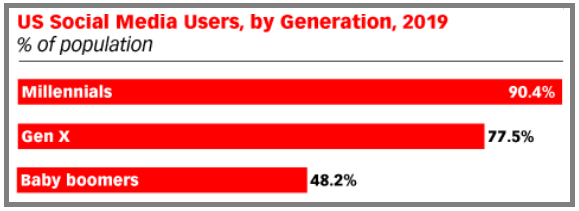— June 6, 2019
We live amidst the great digital revolution where everything from how customers greet and interact, to how they think, buy, and choose depends heavily on social media. Not only is social media powerful and in so many ways governing customers, but it’s also unavoidable. It’s just everywhere and come the future, it’s only going to get bigger and better. Brands should understand where the world is at present and where it is most likely headed. Only then will they be in a position of strength and enjoy competitive advantage. Let’s look at a few modern-day facts that every brand should know while compiling their marketing strategy.
Fact File: A recent study indicates that there are 3.2 billion social media users worldwide as on 2019, which is equivalent to 42% of the current population.
1. Segmentation by generation – Know who to target and where
One of the key aspects while formulating a marketing strategy plan is customer segmentation. Especially when it comes to social media marketing, it is excessively important to be aware of what the facts are. Market segmentation is all about choosing your target audience as per the product or service, and knowing where best to interact with them. For instance, one way of approaching them is by segmenting them generation wise.
Several studies indicate that millennials have the most access to smartphones, compared to Gen-Xers who prefer tablets more. In the USA, millennials account for the highest number of active social media users (90.4%), followed by Gen X and Baby boomers. Brands should keep themselves abreast the latest industry numbers to have a better indication of how to target customers on which platform.

Fact File: Findings suggest that Gen Z (49%) and Gen Y (48%) make greater use of mobiles to make payments as compared to Gen X (28%) and Boomers (11%)
2. Customer Service – Master the art of developing life-long customer relationship
The advent of e-commerce has meant that a huge number of people across demographics resort to shopping online. One of the things that customers rely on while purchasing online is 3rd party reviews & recommendations. Latest findings indicate that 54% of social browsers use social media to research products. Now while researching about products and checking out reviews, it’s quite natural that customers might have a few queries in their minds that they would want brands to properly address.
Customer service therefore is one of the key areas that brands need to focus on. For instance, brands that quickly respond to customers’ queries/comments on social media contribute to a positive overall experience for them. This also helps them develop deep-rooted, long-term relationships with them. If optimum levels of customer service are deployed on social media, not only will customers feel satisfied and loyal to brands, but also preach the nicety of their service and quality to fellow peers. This will lead to the perfect 3rd party word of mouth advertising which is highly essential for brands.
Fact File: 71% of people who have a positive experience with a brand on social media are likely to recommend the brand to their friends and family.
3. Influencer Marketing – Know which influencer is right for your brand
Influencer marketing has been a popular phenomenon in the world of social media marketing for quite some time now. However it is now evolving into something more categorized as we see micro and nano influencers coming to the fore. Brands now understand the importance of targeting customers in a more specific way. Micro and nano influencers allow them just that as their audience is niche and restricted to a particular domain. Moreover, customers now perceive high-end celebrity influencers as paid brand advocates. What they demand is complete transparency and authenticity where an influencer will speak his mind and not provide a superficial opinion. Besides, hiring micro and nano influencers also save brands a lot of money as celebrity macro influencers is known to charge a lot of money.
Which influencer to choose ultimately depends on what the brand’s objective is? If brand awareness is the agenda where a lot of people need to be notified, then micro and nano influencers are no match to mega and macro influencers as their reach is far superior. But when it comes to portraying a realistic and transparent claim, micro/nano influencers who are basically an expert representative/opinion leader of a particular industry or domain can be highly efficient, at the same time cost-effective.
Fact File: 94% marketers believe that the key to success in influencer marketing lies in transparency and authenticity.
4. Social Media Users – In mobile lies the real reach
As we already know, the population of people that access social media is immense. There are around 2.32 billion active monthly users on Facebook alone. But, it is not about knowing the numbers on various platforms. Brands must know the internet-enabled device of choice of their customers, as only then will they be able to curate content which is responsive to that particular device.
In this case, mobile phones win hands down.
For 91% of users, mobile phones are the preferred device for accessing social media channels. To be honest it’s not surprising at all given the high tendency of people across the globe to resort to smartphones. This means that brands should ensure that all the content interfaces and layouts they create should be optimized for mobile devices. This will give brands a chance to make their content accessible to their customers at all times as people carry their smartphones everywhere they go.
Indeed the real reach lies in mobile.
Fact File: At present, there are around 10 million active Facebook accounts on feature phones.
5. Social Listening – Know what’s working and what’s not
With so much of the marketing and branding endeavors resting on social media, it’s a no brainer for brands to keep a tab on what happens on these social platforms after they are done delivering their content. Social listening continues to be an integral part of every marketing strategy and nothing is scheduled for change in the near future. Social listening allow brands to make informed choices/changes as they get to know which content is most engaging, what draws the most interactions, and what completely repels customers and draws heavy criticism. Moreover, they get a clear picture of what their competitors are doing and how they can close the gap. Besides, social listening provides real-time analysis of what’s working and what’s not on the basis of live data results. Brands don’t have to organize separate focus groups to facilitate research findings which can be an expensive affair. Hence, social listening is considerably cost-effective as well.
Another advantage of social listening is it helps in timely crisis management as it keeps a watch on negative feedbacks and customer grievance comments. It also helps brands understand where it’s necessary for them to intervene and voice its opinion or respond to customers. Responding to customers is important as it helps develop brand relationships for life; especially considering the fact that a huge percentage of online social queries go unanswered and ignored. Social listening helps brands stay abreast with all the happenings on social media, which enables them to add/alter/modify their content marketing strategy as and when they deem fit.
Fact file: As many as 89% of social messages go unanswered on social media; readings that all brands must look to change sooner rather than later.
Originally published here.
Digital & Social Articles on Business 2 Community
(35)
Report Post




